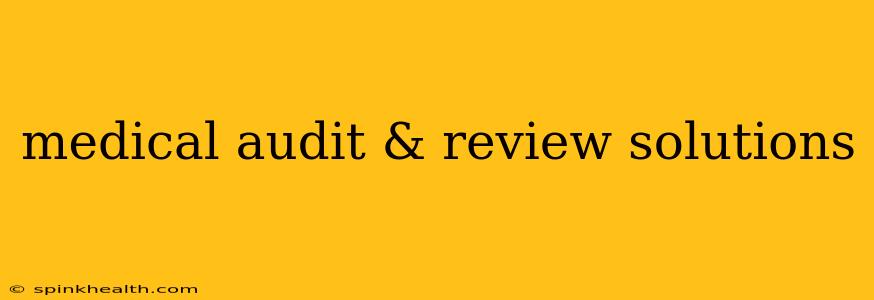The healthcare industry is a complex web of regulations, procedures, and patient care. Maintaining high standards of quality and adhering to strict compliance regulations is paramount. This is where medical audit and review solutions step in, acting as critical tools to ensure efficiency, accuracy, and ultimately, better patient outcomes. But what exactly are these solutions, and how can they benefit your healthcare organization? Let's delve into the world of medical audits and reviews.
Imagine this: you're a busy hospital administrator, juggling countless tasks and striving to provide the best possible care. Suddenly, a regulatory audit looms, or perhaps internal data suggests areas for improvement. This is where a robust medical audit and review system becomes invaluable—your lifeline in navigating the complexities of compliance and quality enhancement.
What are Medical Audit & Review Solutions?
Medical audit and review solutions encompass a broad range of processes and technologies designed to systematically examine medical records, billing practices, and operational procedures to identify areas for improvement, ensure compliance, and enhance the quality of patient care. They act as a comprehensive check-up for your entire healthcare system, highlighting both strengths and areas needing attention. These solutions can range from simple manual reviews to sophisticated software-driven systems that automate many aspects of the process.
What are the different types of medical audits?
There are various types of medical audits, each serving a distinct purpose. These include:
- Clinical Audits: These focus on the quality of clinical care, examining patient records to assess whether established guidelines and protocols were followed. This could involve reviewing diagnoses, treatments, and patient outcomes.
- Financial Audits: These audits scrutinize billing practices, ensuring accurate coding, claims submission, and reimbursement processes. They are crucial for maintaining financial integrity and complying with regulatory requirements.
- Compliance Audits: Designed to ensure adherence to regulatory guidelines and legal standards, including HIPAA (Health Insurance Portability and Accountability Act) and other relevant laws.
- Operational Audits: These examine the efficiency and effectiveness of healthcare processes, looking at areas like appointment scheduling, medication management, and staff workflows.
What are the benefits of using medical audit & review solutions?
The benefits of implementing robust medical audit and review solutions are numerous and far-reaching. They contribute to:
Improved Patient Care:
By identifying areas where care could be improved, audits lead to better patient outcomes, reduced medical errors, and enhanced safety.
Enhanced Compliance:
Regular audits ensure compliance with all relevant regulations and reduce the risk of penalties or legal action.
Increased Efficiency:
Streamlined processes and identified inefficiencies lead to cost savings and improved resource allocation.
Better Data-Driven Decision Making:
Data collected during audits provides valuable insights for strategic planning and resource allocation.
Strengthened Reputation:
Demonstrating commitment to quality and compliance enhances the organization's reputation and fosters trust with patients and stakeholders.
How do medical audit & review solutions work?
Medical audit and review solutions utilize a combination of methodologies and technologies. This often involves:
- Data Collection: Gathering relevant data from various sources, including electronic health records (EHRs), billing systems, and other databases.
- Data Analysis: Using statistical methods and data visualization techniques to identify trends and patterns in the data.
- Report Generation: Creating comprehensive reports that summarize audit findings, identify areas for improvement, and propose corrective actions.
- Corrective Action Plans: Implementing strategies to address identified deficiencies and ensure ongoing compliance.
- Follow-up Audits: Conducting periodic audits to monitor the effectiveness of implemented corrective actions.
What are the key features of effective medical audit & review software?
Effective medical audit and review software typically incorporates features like:
- Automated Data Extraction: Streamlines the data collection process.
- Advanced Analytics: Identifies patterns and trends that might be missed with manual review.
- Customizable Reporting: Allows for tailored reports specific to organizational needs.
- Secure Data Storage: Protects sensitive patient information.
- Integration with EHRs: Enables seamless data integration.
What types of healthcare organizations benefit from medical audit and review solutions?
Nearly every type of healthcare organization can benefit from robust medical audit and review solutions. This includes hospitals, clinics, physician practices, nursing homes, and insurance companies. The specific needs and the scale of the solution will vary depending on the size and complexity of the organization.
This comprehensive look into medical audit and review solutions highlights their critical role in ensuring high-quality patient care and regulatory compliance. By embracing these solutions, healthcare organizations can proactively address challenges, improve efficiency, and strengthen their commitment to providing the best possible patient experience.

